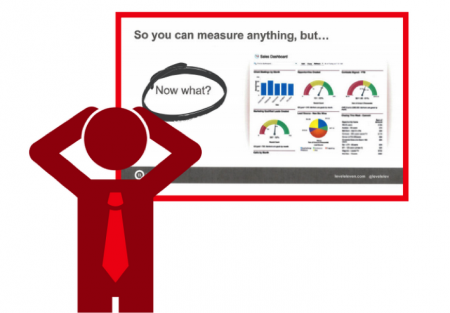 Having a data-driven sales environment doesn’t just mean that leadership bases decisions on numbers — it means that salespeople are looking at them, too. Among everything else your reps juggle, getting them to even look at data — let alone focus on it — can be difficult. Here are three tips to help you out:
Having a data-driven sales environment doesn’t just mean that leadership bases decisions on numbers — it means that salespeople are looking at them, too. Among everything else your reps juggle, getting them to even look at data — let alone focus on it — can be difficult. Here are three tips to help you out:
1. Communicate sales metric relevance.
Of course, visibility is key in getting your reps to stay focused on sales metrics. We talk about that a lot. (Read: “10 Reasons Your Sales KPIs Need More Visibility” for more on the topic.) But aside from keeping sales metrics in front of your team, you also need to make sure you’re communicating them optimally. A big part of that is explaining to sales reps why metrics are relevant for them.
Research shows that when someone understands the relevance behind something, they’re more likely to feel competitive about their performance around that thing, or behavior, which can drive better results. So for example, one early study tested out the idea of telling people that an activity was highly relevant to their intelligence. Those people performed the activity significantly more competitively than people asked to complete the activity without mention of its relevance to intelligence. (Read “4 Ways Psychology Can Strengthen Your Sales Contest” to learn more.)
When communicating your sales metrics to your team make sure you explain how focusing on these sales metrics will help them hit their goals. Explain the difference between leading and lagging indicators. Show how your leading indicator metrics go hand in hand with hitting goals. Make sure your reps understand that their main sales metrics will lead to them hitting goals and therefore the organization’s growth as a whole. This will provide purpose behind the implementation of sales metrics. That way your reps aren’t just focusing on sales metrics without any idea of their connection to the business and its success.
2. Narrow your team’s focus.
When creating a metrics-driven environment, it’s possible to get a little overzealous and try to motivate every KPI you can think of. Trust me when I say that’s not a good idea. Motivating too many sales metrics will dilute the value of any one metric. It’s also just plain confusing for your team. Three or four is plenty for them to stay focused on. And when these are the right sales metrics, it’ll be game-changing — your team will optimize performance around the few metrics that really matter, rather than just lifting performance slightly across every data point.
3. Change up metric motivation.
We’ve all experienced burnout at one point or another, oftentimes from feeling overworked, overwhelmed or just in need of a break. But what if your sales reps are feeling burned out for a completely different reason? What if it’s because you run the same motivation campaigns around your sales metrics all the time?
We see this firsthand all the time, with leaders using the same sales contests to motivate their team’s metrics. The campaigns lose engagement when they become more expected. The good news is that even a minor change — for example, adding on a new sales incentive as an added bonus to the contest, or putting points behind another important sales metric — can refresh engagement and the motivate that comes with it.
So, whether you motivate sales metrics through contests or another channel, make sure to change things up. If you need some help brainstorming, get new sales contest ideas here and sales incentive ideas here.



